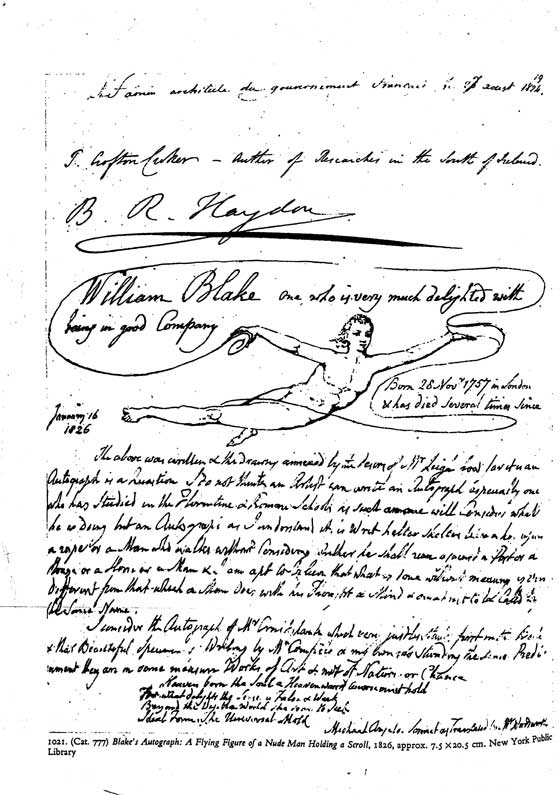 As an example I will follow the post on Michelangelo with another mention of him in another context many years after the portrait of Michelangelo was engraved in 1801. In 1826 Blake produced his 'autograph' in the Album of William Upcott. Mr. Upcott made a hobby of collecting autographs of famous men as well as friends and associates. He eventually had a collection of 2069 in 31 volumes. Blake provided more than a simple autograph.
As an example I will follow the post on Michelangelo with another mention of him in another context many years after the portrait of Michelangelo was engraved in 1801. In 1826 Blake produced his 'autograph' in the Album of William Upcott. Mr. Upcott made a hobby of collecting autographs of famous men as well as friends and associates. He eventually had a collection of 2069 in 31 volumes. Blake provided more than a simple autograph.When Blake says at the beginning of his autograph that he is delighted with the company, he may be referring to all the influential people who also signed their autographs. Blake's reference to having died several times intimates that he has been reborn several times as well. Blake indicates that the word 'autograph' should not be used both for something written unconsciously and something done with 'thought & mind'. His own autograph and two others he considers to be 'Works of Art & not of Nature or Chance.'
Finally I get to the connection with Michelangelo. Blake concludes with a sonnet by Michelangelo translated by Wordsworth. But of course it is not just any sonnet but one which conveys Blake's understanding of the connection of the soul of man with the source from which it originates. Blake's autograph is not only words but a visual image as well. The soaring soul seeking the 'Universal Mold' is seen in the youth with arms outstretched (reminiscent of Glad Day): Blake himself released from the garment of the body.
Miscellaneous Prose, (E698)
"WILLIAM BLAKE one who is very much delighted with being in
good Company
Born 28 Novr 1757 in London
& has died several times since
January 16
1826
The above was written & the drawing annexed by the desire of
Mr Leigh how far it is an Autograph is a Question I do not
think an Artist can write an Autograph especially one who has
Studied in the Florentine & Roman Schools as such an one will
Consider what he is doing but an Autograph as I understand it, is
Writ helter skelter like a hog upon a rope or a Man who walks
without Considering whether he shall run against a Post or a
House or a Horse or a Man & I am apt to believe that what is done
without meaning is very different from that which a Man Does with
his Thought & Mind & ought not to be Calld by the Same Name.
I consider the Autograph of Mr Cruikshank which very justly
stands first in the Book & that Beautiful Specimen of Writing by
Mr Comfield & my own; as standing [in] the same Predicament they
are in some measure Works of Art & not of Nature or Chance
Heaven born the Soul a Heavenward Course must hold
For what delights the Sense is False & Weak
Beyond the Visible World she soars to Seek
Ideal Form, The Universal Mold
Michael Angelo. Sonnet as Translated by Mr Wordsworth"
what a beautiful sonnet! I've been (in my meager spare time) digging into the (other) romantic poets, following Bloom's "Visionary Company" -- what a gift this sonnet is!
ReplyDeleteI recently encountered the theme of multiple deaths (and therefore re-births) in one of my new favorite writers, Carlos Eire. e.g. his "Learning to Die in Miami: Confessions of a Refugee Boy" is about his experiences as a young teenager airlifted with his brother from Cuba to Florida soon after the Castro takeover...
I've also been reading children's books about insects (choosing some for my grandsons) which are big on moulting...
:-)
Charles Williams said that we should be dying each others' lives and living each others' deaths.
ReplyDeleteThat is quite a thought to get a hold of.
"we should be dying each others' lives and living each others' deaths."
ReplyDeletemy goodness. who is Charles Williams and what does he mean? I'm going to think about it, but I'm having trouble getting a hand-hold so to speak....
Charles Williams was a friend of CS Lewis.
ReplyDeleteOne idea Williams promulgated was that we are interrelated. He felt that at a spiritual level we do for one another what one cannot do for one self.
The task of 'dying one's life', of relinquishing the wounds and resentment which prevent growth may not be possible without the help of another. The spiritual friend may bear the pain and sorrow for one so that obstructions may be put to death.
Living one's death is the opposite side of the coin. The release of the 'new man' is the death of the 'old man'. One might live another death by recognizing and supporting the transformation which follows the rebirth.
http://www.youtube.com/watch?v=Z5w134gYz04
http://en.wikipedia.org/wiki/Charles_Williams_%28British_writer%29
thanks, Ellie -- it was great hearing CS Lewis' actual voice! and I appreciate the explanation... we really are all in this thing (life, consciousness, imagination) together!
ReplyDelete